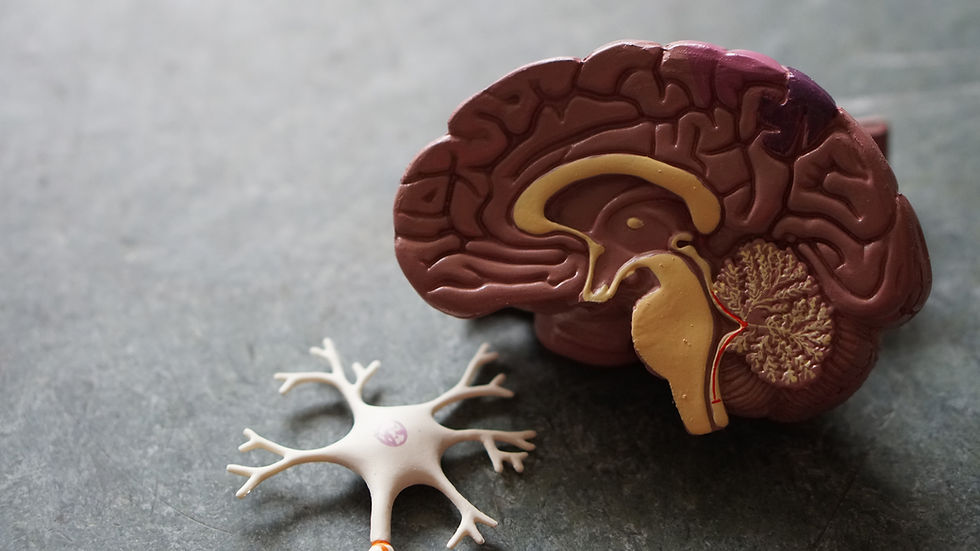Reliving it all over again... Why Do we Replay Traumatic Memories?
- Paweł Ślizewski
- Jan 15, 2024
- 4 min read
Updated: Oct 17, 2025

Have you ever wondered why, in therapy, one sometimes needs to confront past painful memories? This phenomenon is rooted in the process of emotional desensitization, crucial for mental health.
Learning to Control Reactions to Traumatic Memories
The desensitization procedure involves deliberately exposing oneself to traumatic memories during therapeutic sessions. However, its purpose is not to mindlessly revisit the past; on the contrary, it aims to teach patients how to control their reactions to painful memories. Incorporating body work into this process is also a crucial aspect, as traumas are often linked to physical experiences and bodily reactions.

During this process, significant changes occur in the functioning of the limbic system, encompassing cortical and subcortical brain structures. These changes contribute to the reduction of excessive emotional reactions, enabling a gradual adaptation to past experiences.
The Role of the Autonomic Nervous System (ANS): Imbalance and Trauma
The autonomic nervous system (ANS) is named for its independence from conscious control. It consists of two main parts: the sympathetic, acting as the "gas pedal" associated with energy expenditure, and the parasympathetic, functioning as the "brake" and responsible for conserving energy. Their collaboration regulates the flow of energy in the body, and their balance is crucial. The sympathetic system maintains blood circulation, alertness, and assertiveness, primarily in states of effort and stress, both positive and negative. On the other hand, the parasympathetic system handles digestion, regeneration, and initiation of social behaviors, mainly in states of rest and relaxation but also in the defensive "freeze" response.
In the case of trauma, an imbalance between these two components and excessive reactions to emotional and sensory stimuli are observed. This manifests as irritability, impulsivity, aggression, anxiety, and a limited ability to effectively cope with stress and return to balance. Often in the context of trauma, the term "autonomic imbalance" is used. Sympathetic activation is then associated with the fight/flight response, adrenaline release, increased heart rate, and redirection of blood from organs to muscles. Meanwhile, parasympathetic activity is linked to acetylcholine release, muscle relaxation, slowed heart rate, and regulation of breathing. For a long time, the sympathetic system was primarily implicated in traumatic reactions, neglecting the significant role of the parasympathetic system in the threat response.

Changes in the Limbic System: Adaptation to Past Experiences
During this process, significant changes occur in the functioning of the limbic system, encompassing cortical and subcortical brain structures. These changes contribute to the reduction of excessive emotional reactions, enabling a gradual adaptation to past experiences.
Biochemical Aspects of Therapy: Cortisol Reduction and Psychological Resilience
In the biochemical dimension, the activation of the autonomic nervous system during therapy influences the secretion of stress hormones such as cortisol. The gradual adjustment of the body to past experiences leads to a reduction in cortisol release, positively impacting overall emotional well-being. This effect contributes to the development of lasting psychological resilience.

Trauma Reprocessing Therapy: Revaluing Life Narrative
Trauma reprocessing therapy not only brings benefits at the neurobiological level but also opens space for the revaluation and restructuring of the client's life narrative. Conscious confrontation with past difficulties allows for the shaping of a healthier self-perspective, understanding of one's emotional reactions, and initiating the healing process.
The quote by Bessel van der Kolk emphasizes that trauma is not just an event from the past; it is also a trace that the event leaves in the mind, brain, and body.
"[...] trauma is not just an event that took place sometime in the past; it is also the imprint left by that experience on mind, brain, and body. This imprint has consequences: it changes the way we deal with the present.
Trauma leads to a complete reorganization of the stimulus processing system by the mind and brain. It alters not only our way of thinking and what we think about, but also our entire capacity for thinking. We have found that helping trauma victims find words to describe what happened to them is crucial, but it is usually not enough. The act of telling one's story alone may not change the automatic physiological and hormonal responses occurring in the body, which remains hyper-vigilant, always ready for attack or assault. To truly change something, the body must learn that the danger has passed and it can start living in the present."
Therapeutic Process: Transforming Challenges into Opportunities for Growth
In this way, trauma reprocessing therapy not only promotes a deep understanding of oneself and the building of psychological resilience but also creates space for crafting a new chapter in the narrative of one's life. Through courageous confrontation with the past, difficulties can be transformed into opportunities for development and self-realization. This process opens the doors to a fuller life, with a new perspective, inner strength, and the ability to shape one's own happiness. 🌿
For more information:


